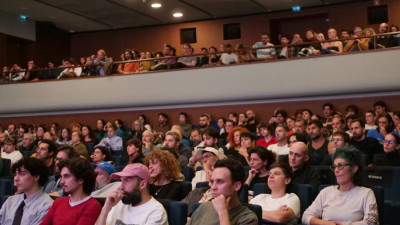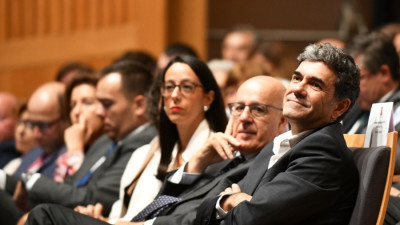1. Since its foundation in 1999, the Left Bloc has rejected the proposal to include the Russian Federation in a collective security system in Europe. This intention has run through almost all European parties to the left of social democracy. It has been enshrined in many party resolutions and also in the Party of the European Left. In this case, with a clear opposition from the Left Bloc. To what was the Left Bloc's objection due? To the perception that the Russian Federation turned democracy into a caricature and wanted to play a strong imperialist role as a power lagging behind in territorial disputes, rich in raw materials but weak in the economy of advanced technologies. For the Left Bloc, it was incomprehensible to propose to the peoples a security system which rightly excluded the United States of America but opened itself up to another focus of militarism and expansion. In the current imperialist aggression against Ukraine, Putin is repeating the pattern of barbarism he had already practised in Chechnya at the turn of the century.
2. The misunderstanding of the imperialist nature of the new oligarchic Russia has biased the policies of many sectors of the left. Today it is important that the same loss of focus is not committed in relation to the imperialist nature of the People's Republic of China, a power that projects itself in economic ambition over several continents, even if it claims to be socialist, an irony with which the second capitalist economy on the planet is covered. The fact that the US is turning China into the main enemy of its economic and military domain does not make defensible the militarised one-party regime that dominates the People's Republic of China, and does not justify the 'Chinese reunification' as a pretext for military threats. As in the Cold War era, the sense of freedom of peoples cannot combat one superpower by supporting another.
NATO: Aggressive alliance at the heart of Washington's imperialist strategy
3. Under the presidency of Joseph Biden, the US took back NATO. This political-military organisation was going through a crisis of existence. Donald Trump considered NATO a burden for the US and defended the unilateral logic of direct confrontations or understandings with the other great powers. The "return" of NATO was hailed as multilateralism, although it is a vision centered on Europe and excluding much of the world. Biden politicised the new mission of NATO, which goes beyond "fighting terrorism", as proclaimed since the fall of the USSR. Now, the flag of democracy against autocracies is raised. This demagogy falls flat when its members and allies include appalling autocracies. Nothing new, or the fascist Salazar had not been called to found the alliance. The objective is different: to formulate a political argument for confrontation with China and, secondarily, with Russia. It is not possible to accept an international order in which the policeman of the world intends to change the regimes of other states. We know in Portugal that democracy is a peoples' objective that involves long struggles, advances and setbacks, and that it never falls from the sky in howitzers. None of the tragedies of the Middle East and North Africa of the last twenty years has made democracies grow anywhere, despite the deadly invasions. We stand in solidarity with the democratic oppositions to the regimes in the People's Republic of China and the Russian Federation, however heterogeneous they may be. On the contrary, waving nuclear war is not a path to democracy, but only to forms of geopolitical control and economic and technological advantage.
Mutual recognition and peaceful relations, enshrined in the Charter of Nations, are the alternative political path to NATO. The risk of a return of the extreme right to power in the White House is enough to make Europe reflect on the weaknesses of democracies and their intermittency, both in the American power and in several European states. Biden should worry about North-American democracy.
4. The permanent challenge to NATO is a feature of the Left Bloc's party identity. Since its founding documents, the Bloc has denounced the militaristic character of the offensive alliance embodied by NATO. If, until the fall of the Warsaw Pact, some sectors of opinion still harbored doubts about NATO's offensive goals, the reinforcement and expansion of NATO, after the end of the USSR, only meant the expansion of North American power. In these last thirty years, we have moved from fighting terrorism to fighting autocracies as the most recent pretext. Indeed, energy sources are protected for Western multinationals, oil, gas and other minerals. Now the task is to eliminate Chinese technological competition so as not to weaken American military superiority. Aggressions on the former Yugoslavia, Afghanistan, Iraq, Syria and Libya had the support or direct intervention of NATO. Millions of dead and wounded, millions of refugees, destruction of civilian areas, environmental catastrophes - these were the results of these wars conducted by US imperialism. The pattern of barbarism that the US applied in Vietnam was replicated in Iraq. Calling itself defensive, NATO formally extended its scope of intervention to the whole globe and not only to the territory of its members. António Costa and Marcelo Rebelo de Sousa, these days, strive to declare that NATO is only defensive, collaborating in a falsehood to gild the Empire. Jorge Sampaio did not think so at the time of the invasion of Iraq. He repudiated an invasion outside the Charter of Nations. The Left Bloc has suggested since 2004 that a system of collective global security should have its matrix in the Charter of Nations and its axis in the United Nations Organisation.
Europe: military colossus, political miniature
5. In the 2009 European elections, the Left Bloc defended the need for non-aggression treaties between European states, which could lead to a situation of active European neutrality as regards the disputes of other powers. Unfortunately, the understanding of the need for European cooperation in defence was crossed by a negative polemic between the defenders of the single hegemony of NATO, nuanced between atlantists and supporters of a European army installed in the European Union as the "European" arm of NATO. This contradiction was quickly resolved because England and France, nuclear powers among other states, do not want to share the military leadership with third parties. That debate closed space for a European cooperation of sovereign states. Interestingly, now Britain, outside the EU, is finalising bilateral defence cooperation treaties. It has just done so with Sweden, Finland and also Portugal. Defence cooperation does not cancel out each country's armed forces or put them in thrall to the military interests of others. However, subservience to the US has only left as a valid perspective the enlargement of NATO that has followed.
6. One of the greatest propaganda hoaxes is that Europe has left military expenditure and armaments to the USA, thus relieving itself of this burden. This invention must be refuted. This was only the case during the period of reconstruction in Europe after the Second World War. This has not been the case for many decades. The countries of the European Union as a whole (excluding all the former Eastern Bloc countries, except Poland) have more active military personnel than the United States or Russia, and their defence budgets are lower than those of the United States (which is enormous), but higher than those of Russia and close to those of China. The Europeans also have nuclear arsenals. The absurd rise in military spending serves only to capitalise the military industry's business. If the countries of Europe wanted to face any threat, acting together, they would have the means and defence capabilities required by the standards of American strategists. This propaganda of Europe as a military miniature serves doubly well to frighten the populations and sell arms, increasing military spending to the detriment of welfare state spending. Significantly, the arms lobby insists on excluding military expenditure from the deficit calculation of the Brussels´criteria.
7. The Left Bloc is opened to a European interstate defence cooperation. For the moment, this possibility, without majorities to move forward in the various states, is only a hypothesis, and depends on a distancing from NATO and the abandonment of interventionism, such as the British in Iraq or the French in the Middle East and various African regions.
The Organisation for European Security and Cooperation (OSCE), whose initial project was European collaboration, has diluted this focus by integrating Russia and the United States of America. Russia has now been excluded and so should the US and Canada. The US is the world's leading aggressive imperialist power. The OSCE, heir to the 1975 Helsinki Agreements on non-aggression and the inviolability of borders, ended up being shaped by the Cold War. Moving the OSCE away from this past is a necessity for the European peoples west of Russia. The OSCE has existed in parallel with the Council of Europe, the body that guarantees human rights and fundamental freedoms. Both are international reference institutions with no ties to the European Union. There is more political Europe beyond the Brussels´ order.
The right to self-determination of the peoples, a mark of the Portuguese revolution
8. For more than fifty years the entire Portuguese left has recognised the right of resistance and insurrection of the oppressed peoples. It could not be otherwise, after the national liberation struggles of the former Portuguese colonies. When it was founded, the Bloco participated in the independence days of East-Timor and showed solidarity with the FALINTIL. The desire for peace does not cancel out the legitimate defence of peoples. Our opposition to the arms race and to the militarisation of the planet and of space does not exclude minimums for the defence of the territorial integrity of a country and a people. Over the years, the Bloc has opposed the Portuguese governments' military programmes aimed at equipping for NATO's adventures. However, we specifically voted in favour of the construction of the essential patrol vessels to guard territorial waters. We voted in favour of a logistics ship for disaster relief resources or essential helicopters. We support the humanitarian and military intervention by the United Nations in East Timor and, in situations of the same type, we are not opposed to interventions, under the authority of the UN, to protect peoples. After the independence of Timor, we have already defended interventions in other situations. The right of resistance and insurrection was naturally welcomed in the Constitution of the Republic. This was a hallmark of the democratic revolution.
9. The alliances for Peace have been much broader than the political-social alliances of the left parties. This is a positive factor in isolating the warmongering circles and the aggressor States. Just as antifascism is not to be confused with anti-capitalism, although they can be intertwined, antimilitarism is not only the opposition to the market of war: it is the defence of human ecology and therefore implies broad alliances, national and international, for controlled disarmament and the eradication of weapons of mass destruction. In the fight against atomic terror, no political sectarianism is valid. From the streets, especially in the aggressor countries, to diplomacy, all trenches are useful. The articulations encompass secular and religious sectors, dissidents of militarism and supporters of peace, political forces and social movements, public figures and popular masses, artists, academics, scientists and other professionals. No one is outnumbered when trying to prevent catastrophes. The struggle for security is not strictly against the violence of armies, but extends to economic and social security, to the security of cultural identities. The concept of "allies for civilisation", between the various continents, is an internationalist and intercultural emergency to respond to uncertain daily lives and popular anguish, exploited by the militarist reaction.
10. The serious consequences of the climate crisis are a new element in the conflict between war and peace. In recent decades it has become clear that we need to change our modes of production and consumption in order to avoid climate catastrophe. This has become the biggest agenda of our times and a central concern of the working classes. The extension of wars and astronomical military budgets delay the decarbonisation of economies, as well as aggravating environmental deficits. Parties like the Left Bloc highlight the interaction of these phenomena, alongside ecologists who take up the fight for peace and many other social movements.
11. In defending the exit from NATO and Portugal's active neutrality, we set out our first task in the defence of Peace. The Constitution does not allow a referendum on the withdrawal from international treaties, except, under certain conditions, those concerning the European Union. Thus, the strategy is to build a parliamentary majority to do so. The task of turning public opinion against NATO to secure such a majority seems today a cyclical and very inopportune one. But it has its time ahead, when it will express popular repudiation of the Atlantic alliance's crimes. This was the case in the past, for example, when the Bloco tabled a motion of censure against the government of Mr Durão Barroso/Paulo Portas for Portugal's involvement in the invasion of Iraq. The initiative was very popular and the remaining opposition tabled similar motions (which were also defeated by the right-wing majority). Firmness of position must therefore go hand in hand with continued clarification and the denunciation of NATO's aggressive nature, in a long battle in which it is important to avoid social isolation.
12. In the country or abroad, we will be with those who fight all imperialisms, whether they unite against the peoples or against each other. All those who want to reduce anti-imperialism to opposition to the United States are not only mistaken but are facilitating Washington's victories. NATO can thank Putin (and his threats of recourse to atomic weapons) for having handed it the Nordic enlargement, Sweden and Finland, on a plate. But NATO is not the solution to security. The Bloc will always oppose any enlargement of the organisation. The rejection of imperialism and the choice of non-alignment are within our reach. Peace is in the hands of people.







